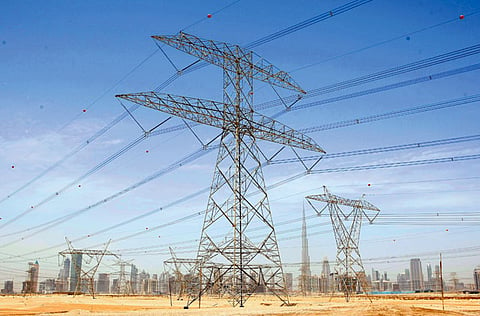Save energy: Turn it down or switch it off
With a few simple steps, Dubai alone could save millions of dirhams worth of energy

Dubai: If consumers in Dubai followed several simple steps, the emirate could save millions of dirhams in energy usage and conserve millions of litres of precious water. And across the UAE, the potential savings from turning off taps, turning up thermostats and thinking twice before using water or electricity, could reduce our carbon footprint significantly.
Dubai Electricity and Water Authority (DEWA) has implemented more than 20 separate initiatives to educate its customers on the importance of energy conservation — simply by using utilities in a rational manner — with savings estimated at Dh177million this year alone.
“Through DEWA’s continuous awareness campaign, we could save 264 million kilowatts of power and 1.46 million gallons,” Saeed Al Tayer, managing director and chief executive officer of DEWA, told Gulf News.
And the need to reduce power and conserve water is more important than ever now with high summer temperatures hovering over the Gulf.
According to DEWA, if every customer turned down the air-conditioning in their homes or offices from 20 degrees Celsius to either 23 or 24 degrees it will have a significant impact in reducing power consumption.
But the figures show that energy-saving measures and public awareness campaigns do work.
Last year, DEWA increased its power generation capacity to 8,718 megawatts, up from 7,361MW the year before. The utilities company also produced 440 million gallons of desalinated water last year, compared to 330 million in 2010.
The company recorded a 4 per cent increase of the number of consumers, adding 22,000 new accounts for a total base of 630,000 customers. While 75 per cent of the consumers are residential accounts, the consumption for the 25 per cent of commercial useers is higher, representing 46 per cent of the total.
According to the Abu Dhabi Water and Electricity Authority, (ADWEA) energy usage in the capital is up 11 per cent year over year. It’s one of the reasons why ADWEA introduced a new utility bill for water and electricity in March 2012, providing customers with more information to monitor and control their consumption.
The Regulation and Supervision Bureau said that separate utility bills show the government subsidy, and that residential customers see two consumption bands indicating an “ideal-average” and above “ideal-average” range of consumption.
But production of water and power usage skyrockets during July and August. That’s why DEWA has introduced its Peak Load campaign to encourage lower consumption of electricity and water during summer months.
As DEWA has to increase its power generation capacity during these hours, resulting in higher consumption of fuel and increased gas emissions, the campaign will try and raise awareness and educate customers on the importance of avoiding the use of electrical appliances and devices between 12 noon and 5pm.
The campaign advises residential consumers on how they can help reduce the strain on generation by switching use of their electrical domestic devices such as irons, washing and dryer machines, dishwashers, water heaters, and electrical ovens, to off-peak hours.
“The load shifts will invariably save fuel used in power generation, and facilitate the conservation of natural resources and reduce emissions,” Al Tayer said.
Dubai is also looking to achieve a 30 per cent power saving by 2030 to ensure efficient use of energy resources and secure a continuous supply while minimising the financial and environmental impact on the emirate, Al Tayer noted.
Moreover, Najeeb Zaafrani, CEO of Dubai Supreme Council of Energy, said that about a 30 per cent reduction in energy consumption in Dubai by 2030 means saving 4 gigawatts of power — equal to the production of seven power plants.
One area that the council is pushing now, he added, was an emphasis on reducing the impact of utilities on the UAE’s huge carbon footprint.
“Air-conditioning consumption represents 60 per cent of the total consumption, so if we implement our strategy in the right way we would be able to reduce it by 10 per cent,” he said.
Sign up for the Daily Briefing
Get the latest news and updates straight to your inbox



